| Srl | Item |
| 1 |
ID:
078843
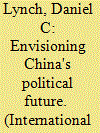

|
|
|
|
|
| Publication |
2007.
|
| Summary/Abstract |
Democratic domestic governance has become a global constitutive norm. The fully socialized, "normal" state in international society is now expected either already to be democratic or embarked upon a democratization trajectory. But in China, the ruling Communist Party (CCP) rejects this norm and vows to construct an authoritarian new "political civilization" superior to democracy. Supportive Party intellectuals contend that most of the constitutive norms asserted to be global are actually manifestations of Western ideational power. CCP elites argue the impossibility of a global culture beyond the agency of states, which they regard as the ontologically primary actors in world politics. China's rise-its rapid increase in comprehensive national power-affords these elites the material and ideational resources they need to resist reconstitution by global democratic norms. Their efforts will probably keep the international society of states significantly pluralist (in the English School sense) well into the future
|
|
|
|
|
|
|
|
|
|
|
|
|
|
|
|
| 2 |
ID:
165872
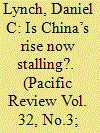

|
|
|
|
|
| Summary/Abstract |
The variations on power transition theory so widely used to frame analysis of U.S.–China relation tend to assume the inevitability or at least strong probability of China surpassing the United States in economic power if not necessarily military power. In the terminology of social psychology’s attribution theory, China is imputed with the identity of a state that is inevitably rising. The Chinese Communist Party encourages this attribution among Chinese people and foreigners. But China’s economic rise – the foundation of its comprehensive rise – appears to have entered an inflection point in the mid-2010s and may now be stalling. In critical respects, China increasingly resembles the last two countries that ‘attempted’ a globe-level rise: the unsuccessful cases of postwar Japan and the Soviet Union. China’s labor force is shrinking; the country relies excessively on unsustainable debt increases to fuel economic growth; and pollution is seriously harming public health. But even if China’s rise conclusively stalls, it may take quite some time before the Chinese public and outside observers recognize the new reality because of intrinsic biases in the cognitive logic of attributing identities to actors.
|
|
|
|
|
|
|
|
|
|
|
|
|
|
|
|
| 3 |
ID:
073888
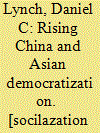

|
|
|
|
|
| Publication |
Stanford, Stanford University Press, 2006.
|
| Description |
xviii, 299p.
|
| Standard Number |
0804753946
|
|
|
|
|
|
|
|
|
|
|
|
Copies: C:1/I:0,R:0,Q:0
Circulation
| Accession# | Call# | Current Location | Status | Policy | Location |
| 051673 | 320.951/LYN 051673 | Main | On Shelf | General | |
|
|
|
|
| 4 |
ID:
123214
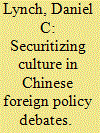

|
|
|
|
|
| Publication |
2013.
|
| Summary/Abstract |
The tendency for Chinese foreign policy elites to securitize culture in international relations by portraying it as a zone of intense contestation with other states suggests that China's rise will be rocky. Some seek to defend China's cultural autonomy from American hegemony, others, to establish Chinese domination over weaker states.
|
|
|
|
|
|
|
|
|
|
|
|
|
|
|
|
| 5 |
ID:
184756
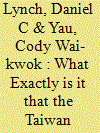

|
|
|
|
|
| Summary/Abstract |
One source of the idea that Taiwan independence would be politically desirable is belief in the concept of “Taiwan subjectivity,” which indicates that Taiwan is not an appendage of China but instead an autonomous actor charting its own course – or trying to do so in the face of huge difficulties. The ruling (since 2016) Democratic Progressive Party (DPP) pledges fealty to the goal of ultimately realizing subjectivity but cannot aggressively pursue the agenda because of opposition from the People's Republic of China (PRC), the United States, and some in Taiwan itself. What might that agenda be? Using a Structural Topic Model, we excavate the subjectivity discourse as it developed from 2008 to 2020 in the mainstream DPP-supporting newspaper, the Liberty Times. We find fourteen topics associated with the concept, the most prevalent of which in recent years warn of threats to subjectivity's realization in the political and sociocultural spheres.
|
|
|
|
|
|
|
|
|
|
|
|
|
|
|
|